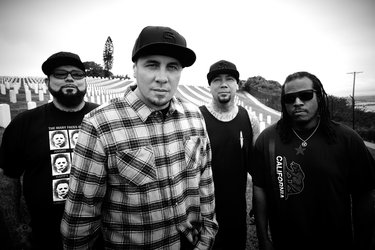 It’s not every day that dreadlocks, tattoos, and alternative rap-metal become the face of Christian music. But in the early 2000s P.O.D. did just that, topping the charts of both Christian and mainstream radio with their highly publicized third studio release, The Fundamentals of Southtown, which was certified Platinum in 2000, followed by Satellite, certified Triple-Platinum in 2002. With electrifying singles “Alive” and “Youth of the Nation,” P.O.D. was bringing inspirational music to the masses and redefining the image of what it means to be a Christian in popular culture. But with incredible success came a tremendous battle—an ongoing struggle to appeal both to the fans spiritually moved by their music and those simply hooked by their hard sound and raw talent.
It’s not every day that dreadlocks, tattoos, and alternative rap-metal become the face of Christian music. But in the early 2000s P.O.D. did just that, topping the charts of both Christian and mainstream radio with their highly publicized third studio release, The Fundamentals of Southtown, which was certified Platinum in 2000, followed by Satellite, certified Triple-Platinum in 2002. With electrifying singles “Alive” and “Youth of the Nation,” P.O.D. was bringing inspirational music to the masses and redefining the image of what it means to be a Christian in popular culture. But with incredible success came a tremendous battle—an ongoing struggle to appeal both to the fans spiritually moved by their music and those simply hooked by their hard sound and raw talent.
With remarkable honesty, P.O.D. lead singer Sonny Sandoval opened up to CCM Magazine, sharing the band’s exhausting career-long crusade to prove their faith to the Christian community while staying true to themselves, the emotional journey toward redemption illustrated on their new album, and the true cost of pushing forward with God’s message, even when their hearts are calling them someplace else.
“We’ve been touring for a long time and the older you get, being married with kids, you know, that’s the hardest part for me, missing home a lot,” Sandoval said, with a surprising frankness. “We’ve been doing this for so long, I feel like I’m just waiting, just praying and asking God, when’s it over? I don’t mean that in a bad way, but I just get tired and my heart is at home. But I feel that there is still a need and people are still listening, so it’s not over until it’s over.”
But with over twelve million records sold, three GRAMMY nominations, and ongoing crossover success, after twenty-three years of making music, personal sacrifices, and industry controversy, P.O.D. has not slowed down. Released on August 21, 2015 their ninth studio album, The Awakening, is one of their most ambitious to date—a concept album following the journey of a lost soul in search of salvation.
“We wrote this record for our fan base,” Sandoval explained. “All these new kids and new music, they kind-of pick apart your art like a buffet, with iTunes, buying only one song. Obviously you want to sell your records and hope that you gain new fans, but this is for our old school fans that dig a little deeper, find the messages and really listen to it from beginning to end. There are so many hidden things going on. We are not trying to be too literal with it. It’s one of those things that we just hope that maybe two years down the road someone is like, ‘Dude! I think this is what they did!’” he added with a laugh.
But despite the album’s subtle and at times overt leanings toward God, Sandoval maintains this album is not just for believers, but for anyone who can identify with feeling lost.
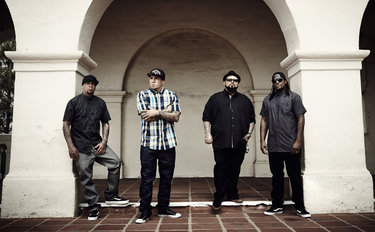 “It’s about this character going through life and everything, all struggles, all evils, ups and downs, and you have to make choices and decisions. This isn’t meant to be a religious record or for Christians only. It’s an art piece and we’re hoping once people dive in, believing and trusting—because that’s how God works—the spirit can speak through it to those who listen and connect with it. So it really does have to do with sin, redemption, forgiveness, love, and it’s all tied in there, P.O.D. style.”
“It’s about this character going through life and everything, all struggles, all evils, ups and downs, and you have to make choices and decisions. This isn’t meant to be a religious record or for Christians only. It’s an art piece and we’re hoping once people dive in, believing and trusting—because that’s how God works—the spirit can speak through it to those who listen and connect with it. So it really does have to do with sin, redemption, forgiveness, love, and it’s all tied in there, P.O.D. style.”
The album’s first single “This Goes Out to You,” is like an anthem. Powerful, hard-hitting, and resonating with the kind of chorus you sing along to, before realizing you’re doing it. The lyrics speak to an unnamed subject, a source of inspiration and respect, as well as a topic of conversation among fans determined to figure out who is the ‘you.’
“We want people to listen, think, and have their own interpretation. It could be about a loved one, someone they respect—maybe its God—but that’s for the listener to decide,” Sandoval said, amused by our attempt to solve the mystery. “But believing that everything we do, that God and the Holy Spirit are in control, and the music is the communicator, He is going to communicate what He wants to communicate. God is speaking to their hearts because He knows them. I don’t know them. Know what I mean? It’s the spirit of God that has intimate connections to these listeners.”
However, “This Goes Out to You” is not the only song Sandoval hopes listeners connect with. With influences of reggae, ska, and hard rock, the musically diverse album also hits hard with tracks like “Criminal Conversations,” “Revolución,” and “The Awakening.”
“I definitely think ‘Criminal’ has got a uniqueness to it, and in my heart and in my mind, I always thought that’s going to be the most controversial song. I love the way it came out. There’s just a feel to it, and once people do find out the real meaning, it’s deep. It’s really true,” he said. “We’ve been playing ‘The Awakening,’ and it already has a connection with people without them ever hearing it before. I believe that’s our new ‘Alive.’ Is it as successful or not? I don’t know. But when we perform it, I think we all believe it, I believe we all feel it.”
Despite P.O.D.’s consistent devotion to their faith, Sandoval was careful as he spoke, never trading his personal truth for what may be expected of him as a Christian artist in a Christian band, but still treading lightly when explaining why the band struggles with being labeled as one.
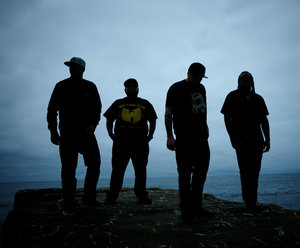 “It was the world that said, ‘Dude, you guys are Christian, right,’ because we were so honest, open and vulnerable about our faith, and at the time even very militant about it…which we’ve learned to replace with love,” he laughed. “But never did we ever market my Jesus to sell records.”
“It was the world that said, ‘Dude, you guys are Christian, right,’ because we were so honest, open and vulnerable about our faith, and at the time even very militant about it…which we’ve learned to replace with love,” he laughed. “But never did we ever market my Jesus to sell records.”
But even after two decades of fierce commitment to making music with inspirational messages, Sandoval admitted that they still feel like outsiders in an industry where they really don’t fit in, describing one of the band’s earliest gigs when they were invited to perform at a church in a nearby Southern California neighborhood.
“We finally got asked to play at a Christian church event, and we were like, ‘Cool, we’ll play wherever you allow us to play!’ It wasn’t event thirty seconds into the first song, and they cut us off by claiming it was ‘ungodly’ and ‘not of the Lord,’ recalled Sandoval. “That was confirmation in our hearts that we were being accepted into the streets already—we were playing clubs, opening up for mainstream bands, playing at bars—and the moment we were asked to do a Christian thing, we were shut down for not being ‘Christian enough.’”
Hitting an obvious nerve with the subject of acceptance, it was clear that Sandoval suffers an open wound not yet healed even after years of success reaching Christian and non-Christian fans alike. As he recounted, it’s difficult to describe his somber tone and demeanor, and when asked how it made him feel to be judged and ridiculed by fellow believers, he said with a sigh, “’I’m not gonna lie…it’s heartbreaking.’”
“Heartbreaking” seemed like a soft choice of words compared to the the deep level of hurt in Sandoval’s voice, but he continued to share the impact that these types of judgments had on him, as well as those living “alternative” lifestyles has had on his relationship with God.
“As a man of faith, filled with the spirit, that’s the thing that has been the biggest struggle in my walk with God,” he said. “It’s been the bitterness that keeps coming up, because I keep looking at God’s people. When my attention is focused on God’s people and all the wrong things that we do in the name of ignorance, it frustrates my walk with God. Because someone who claims to know the Lord, they can sit here and by the look of you say, ‘That guy doesn’t know the Lord.’ But when have they ever sat down and listened to our hearts? That is something I wrestle with. But, God sits me down in his lap and speaks His mind and says, ‘I know son, I know. Just keep your eyes on me and, what I’ve called you to do.’”
Though many bands would have caved under the pressure to be either more “mainstream” or “more Christian,” Sandoval stands strong in his belief that they wouldn’t be where they are today, or have the same impact on their listeners, if they had changed who they are just to “fit in.”
“We always said, ‘We were never Christian enough for Christians, and we were too Christian for the world.’ The moment you mention ‘Jesus,’ you’re just ‘too Christian.’ So we had to be ten times better than the bands we played with,” Sandoval explained. “But we’re not changing who we are, we’re just living out our testimony, our faith for people that dig it, trusting that the message was getting through. I believe it is still a testimony that we have the tools to reach the very people that our churches, pastors, and our evangelists aren’t reaching.”
With that statement, Sandoval drives home a great point. By largely fitting outside the mold of what most people envision when they think of a “Christian band,” P.O.D. has been able to play a unique role in the lives of their fans in producing uncompromised, powerful music, and spiritually connecting with individuals outside of the Church’s reach.
“[It’s inevitable that] I’ll run into somebody later this week who will say, ‘Dude I saw you twenty years ago. I was sitting in this bar you guys played, and I didn’t give my life to the Lord that moment, but you guys were an instrument—you guys had a part in it. All because I remember you playing in front of ten people in this little bar in Chino, twenty years ago…’ That’s when you have those ‘a-ha’ moments, when God says, ‘See, I told you, I know what I’m doing.’”
Sandoval continued, “It’s easier to go to a youth conference and tell everyone to say, ‘Jesus!’ and you have 20,000 people screaming, and you believe that’s God moving—and I’m sure it is. But try being in front of 20,000 people that are going to hell, with that different mentality, where your heart is broken and it is weeping for these people and you’re thinking, ‘I don’t want to overdo it, because I don’t want to preach and turn them away.’ Because they’ve already been turned away, and that’s the thing. You need to know how to speak their language, because a lot of them have heard the ‘Christian language’ all their lives, yet they still didn’t have a relationship with God. I got saved because God met me where I was at.”
A native of Southern California, Sandoval grew up in a young, migrant family he described as, “products of the street.” He witnessed friends and family partying, selling drugs, and admits he was headed down the same road until his uncle and mother were saved.
“Long story short, my uncle gets saved. A true conversion. He was like, one of the craziest guys in San Diego. But he didn’t preach to anybody, and just [told everyone], ‘God changed my life, and I’m gonna live it!’ And because he lived it, really lived it, God started to change the people around him. My mother being one of them.”
Though raised a Catholic, Sandoval confessed he never had a personal relationship with God. And as a teenager, even after his mother was saved, he didn’t feel the impact of God in his own life until his mom was diagnosed with leukemia when he was just eighteen, which brought him to a standstill.
“I watched her be what Christianity is supposed to be. I watched her, until her last breath, be what Jesus was calling her to be. And it made me want that, I desired that. I desired that peace and that love. And so on the day she died, before she passed away, in those last moments I asked God into my heart. I said a prayer, and I had a real conversation with the Lord, and I believe He forgave me and saved me right there. And when I told that to my mom, she was already kind-of in a coma state, it wasn’t long after that that she went to meet the Lord.”
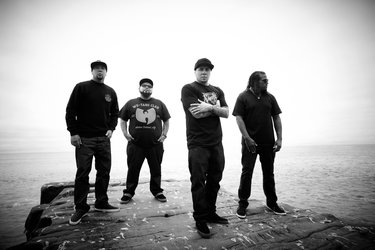 Sandoval credited this defining moment of transformation as the foundation on which his entire life with Christ has been built, and the direct cause of his desire to serve the Lord, ultimately leading toward his journey into music.
Sandoval credited this defining moment of transformation as the foundation on which his entire life with Christ has been built, and the direct cause of his desire to serve the Lord, ultimately leading toward his journey into music.
“Once you start to experience the realness, you begin to have a burden for people who don’t know God. And then you’re like, ‘We need to tell them, we need to go out there,’ because you know, this is the truth. Never did I have the desire to be in a rock band—that was the furthest thing from my mind. I was the shyest kid you’d meet!” Sandoval said. “But when I asked God, when I prayed and said, ‘God will you use my life? I don’t know much, I don’t have much, but would you use my life?’ All of a sudden I got asked to be in this band. And I was like, ‘Okay, that’s not of God, because I don’t know what I’m doing!’ I didn’t have the skills, and I wasn’t a musician. I couldn’t even stand in front of people and talk!”
But after years of following underground musicians in the alternative rock scene of Southern California, hearing them voice their beliefs, passions, and opinions through music, Sandoval was inspired to do the same, using his voice as a channel for God’s truth.
“Everyone’s there for something, whether you’re a vegan, a straightedge, a Buddhist—they are on that stage screaming what they believe in. And I respect all of those people, because they stood in front of whoever would come to their shows and screamed to their faces what they believed in, and I thought ‘I can do that!’” he said, with a hearty laugh. “That I can do! I could tell people God changed my life—I can do that! And that’s all the testimony I needed.
“For my heart, I want to see people get saved,” he continued. “ [P.O.D.] might not be Bible scholars, but we sure know how to spot a broken heart and be able to make them smile and say, ‘Hey, God’s got you.’ Despite even our own doubts sometimes.”
Doubts in anyone’s life can be pervasive. But for a successful Christian rock band, touring the country and playing music is about more than self-promotion. It is ultimately about spreading God’s message of love and healing, and for P.O.D., the added weight of maybe being some individuals only shot at hearing it.
“That’s the only thing that makes this worthwhile,” Sandoval said with a sigh, admitting P.O.D.’s unique role in reaching people unlikely to be reached otherwise, is both a burden and a reward evident not only in his personal life, but in his spiritual life as well.
“Who doesn’t want to be in the church seven days a week? I do. I need that. To me, that’s like my medic in the battlefield. I need to go to church. I need to sit and be with God, and just be restored. But there is this real life battle and so, as any spiritual soldier, I get tired, you know? And so I ask God all of the time, ‘Is this it?’”
When the conversation fell back to his family, his emotions took a turn. “I’ll be celebrating my nineteenth anniversary with my wife this November. I’ve known her twenty-five years. She was there before [P.O.D.], and before I was saved. I love being married, I love my three kids. I can break down just talking about them,” he said, noticeably moved.
“They’ve taught me more about my faith and guided me more toward God than anything and anyone has. Experiencing them and being a father, I can understand how God sees me. Not as God, and you know, He’s in control and how I should fear Him, but how god sees me is how I see my kids. I am loving them, I am forgiving them, I am trying to guide them, and they don’t always listen,” he added with a laugh. “But I’m trying to speak the truth to them, I’m watching over them, I’m protecting them, I’m guarding their hearts, I’m guarding their minds. So I connect with God on that level, because that’s Christianity, that’s your relationship with Jesus.”
Being a father, which he described as the greatest joy in his life, has also led to the greatest feelings of grief, as he continues to watch his kids grow older, at times from a far while on tour, out of the country, and even long days recording. His pain his palpable, his anguish authentic, not only for the lost moments with his children, but for the fear so many parents share, of their children getting hurt, feeling lost, and at the very worst, abandoned.
“Sometimes people will say, ‘Well, I’m doing the Lord’s work,’ and then they neglect and forget their own kids and their own families, then they’re families turn away from the Lord. Because, maybe Dad was out saving the world, but [his family] really needed him. And I see that more when I’m speaking at churches, or hanging out with pastor’s kids, than anywhere else. And so my grief, my worry and concern, is if my kids are strong enough.”
But it’s not just the fear of his children’s potential weakness that aids in Sandoval’s worries, it’s the stories from other kids that he’s exposed to every day on tour, struggling with so much pain, and feeling incredibly alone.
“I go and I tour, and you know my biggest grief, because I talk to kids all the time, from suicide attempts, to cutters, to drugs, to everything that the world gives them, that the enemy gives them. And I’m always believing, ‘Well that can’t touch my kids.’ But, why? Because…” His voice cracked as he paused, then Sandoval took in a deep breath before continuing through a muffled cry. “Because, supposedly, ‘I know Jesus?’ That [the things I see other kids dealing with] can never touch my family? But that’s not true. So these kids I talk to all the time, they are kids. They have just been exposed to too much.
“So a grief for me is that, when I’m supposed to be putting my kids first, I constantly have to keep giving them over to the Lord, trusting He will protect and watch over them. Am I giving them enough? Am I giving them enough of You? Am I being the person I’m supposed to be?’ And I have to hope they understand. And they know without a shadow of a doubt that their Dad is out there, and people are coming to know Jesus because of what he does. But are they okay with the cost? Am I ok with the cost?”
But where there is fear, confusion, and guilt, there is also a commitment. Not just from Sandoval, but the entire band, who together, create a unique musical and spiritual force to be reckoned with. Through a long-standing career, overcoming adversity and their own struggles with faith, P.O.D. has managed, with astounding success, to reach far beyond the CCM audience, and successfully break through the barriers of mainstream radio. With their iconic sound, boundless creativity, and dedication to spreading God’s message, P.O.D. is here to stay. Until of course, God has other plans.
“If God says to go home and be with my family, you best believe I’m going home to be with my family. I don’t need to be a rock star, I don’t need to be in a rock ‘n roll band, I don’t need any of that stuff. I never asked for it. It just happened. And to go back to what I said before, I’m always asking God, ‘When ever you’re done?” Sandoval laughed, tired with sincerity.
“’When ever I’m done, let me know.’ I don’t want to give up too soon. I want to know it’s all finished. I want to leave and lay it all down when I believe it’s finished, and God has said, ‘Well done,’ and we could all move on with the next phase of our lives. Whatever that is.”

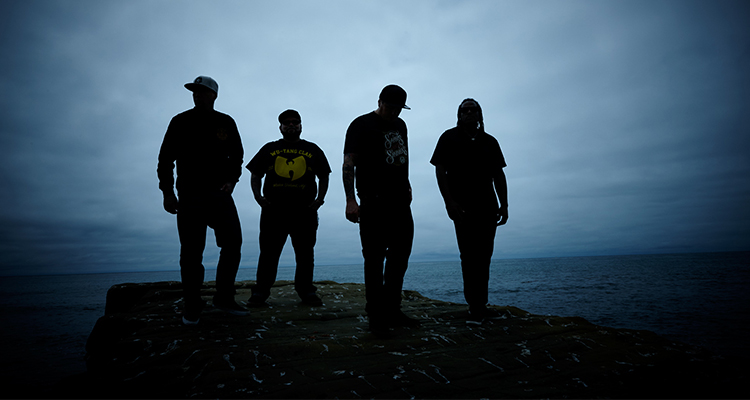
Man I needed this tonight, sitting here alone wondering where or what I’m supposed to be, this gives me hope.
Great interview. I love P.O.D.